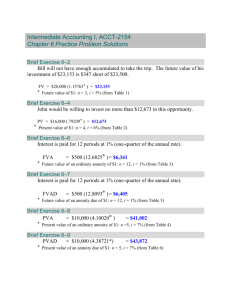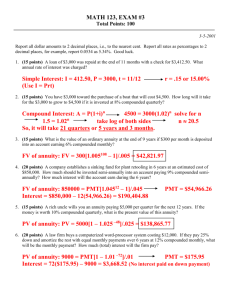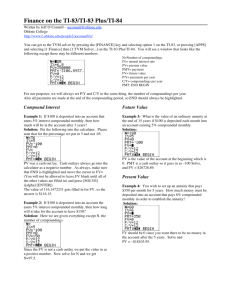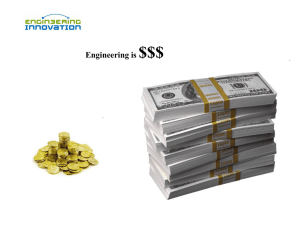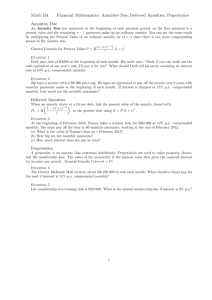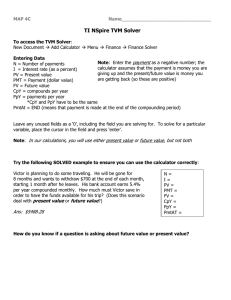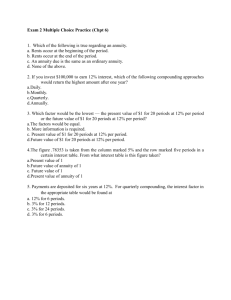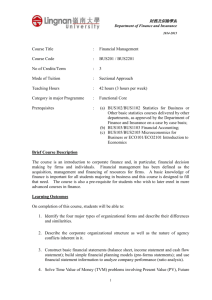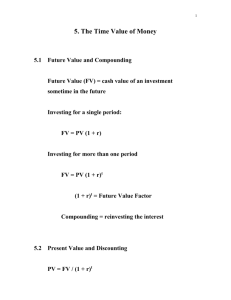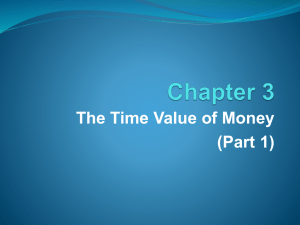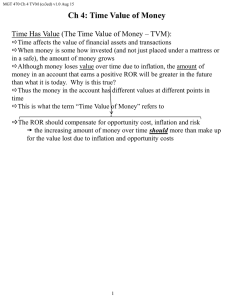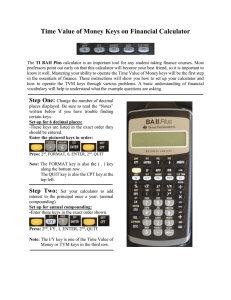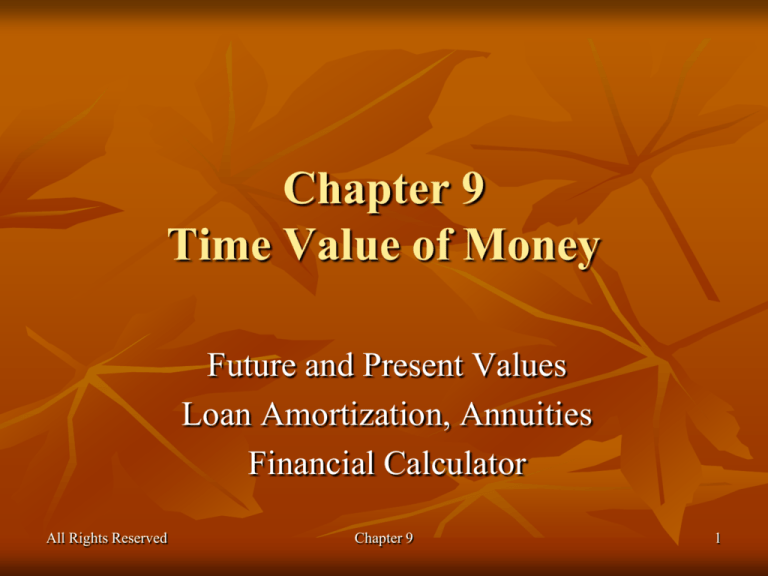
Chapter 9
Time Value of Money
Future and Present Values
Loan Amortization, Annuities
Financial Calculator
All Rights Reserved
Chapter 9
1
INTRODUCTION
A. What is something worth?
1. In economics and finance, the expectation is that the
price we pay ought to be related to the value we receive.
2. We seek to relate time and value
B. Two Important Questions
1. What will a quantity of money invested today be worth
tomorrow?
2. What will a quantity of money to be received tomorrow
worth today?
All Rights Reserved
Chapter 9
2
INTRODUCTION
C. The time value of money (TVM) forms the
basis for analysis of value or worth.
1. How saving and/or investing are reltd to wealth.
2. A dollar invested today will earn interest (or
dividends) and be worth more tomorrow.
All Rights Reserved
Chapter 9
3
Time Value of Money
I.
Four Critical Formulas
A.
B.
C.
D.
Future Value: value tomorrow of $1 invested today.
Present Value: value today of $1 to be received
“tomorrow”.
Future Value of an Annuity: value several periods from
now of a stream of $1 investments.
Present Value of an Annuity: value today of a stream of
$1 payments to be received for a set number of future
periods.
All Rights Reserved
Chapter 9
4
Important TVM Concepts
A. Future Value
1. What $1 invested today should grow to over time
at an interest rate i.
2. FV = future value, P = principal, i = int. rate.
a. I = interest (dollar amount), I = P i
3. Single interest: FV = P + I = P + P(i) = P(1+i)
4. Multiple Interest Periods: FVi,n = P (1+i)n
b. (1+i)n = Future Value Interest Factor
c. FVi,n = P FVIFi,n
All Rights Reserved
Chapter 9
5
Important TVM Concepts
B. Present Value;
1. The value today of $1 to be received tomorrow.
2. Solving the Future Value Equation for PV;
a. PV = FV (1+i) single period discounting.
b. PV = FV (1+i)n multi-period discounting.
c. PV = FV (1+i)-n common form.
d. (1+i)-n = Present Value Interest Factor.
e. PVIF = 1 / FVIF (and vice-versa for same i, n)
All Rights Reserved
Chapter 9
6
Important TVM Concepts
C. Future Value of an Annuity (FVA)
e.g. Retirement Funds: IRA, 401(k), Keough
1. A series of equal deposits (contributions) over
some length of time.
2. Contributions are invested in financial securities;
stocks, bonds, or mutual funds.
3. The future value of accumulation is a function of
the number and magnitude of contributions,
reinvested interest, dividends, and undistributed
capital gains. FVA = PMT * FVIFA
All Rights Reserved
Chapter 9
7
Important TVM Concepts
D. Present Value of an Annuity (PVA)
1. Insurance Annuities
a. Provide recipient with a regular income (PMT) for a
set period of time.
b. The present value (PV) of the payments to be received
is the price of the insurance annuity.
c. PVA = PMT * PVIFA
2. Types of Annuities:
a. Ordinary Annuity: payments received at end-of-period.
b. Annuity Due: payments received at beginning-ofperiod
All Rights Reserved
Chapter 9
8
Important TVM Concepts
3. Annuitize Investment Accumulations
a. We have accumulated a sum of money and now desire
to begin a series of [N] regular payouts: e.g. monthly
checks
b. We assume accumulated funds will continue to earn
some rate of return (I/YR)
c. The accumulation is treated as the present value (PV).
d. How much income (PMT) will a certain accumulated
amount produce?
All Rights Reserved
Chapter 9
9
Computing FVA
A. FVA formula:
1. FVA = P ([(1+i)n - 1] i) = P FVIFA
[(1+i)n - 1] i = future value interest factor for an
annuity or FVIFAi,n.
1. Assumption; steady return rate over time and
equal dollar amount contributions.
All Rights Reserved
Chapter 9
10
Computing PVA
A. PVA formula:
1. PVA = P ([1 - (1+i)-n] i) = P PVIFA
[1 - (1+i)-n ] i = present value interest factor for an
annuity or PVIFAi,n.
1. Assumption; constant return rate over time and
equal dollar amount distributions.
All Rights Reserved
Chapter 9
11
TVM Problems
Question #1: How much will $1,000 grow to if left
on deposit for 10 years in a savings account that
pays 5% per annum compounded monthly?
Question #2: How much is $10,000 to be received 5
years from now worth today if we assume a
discount rate of 9% per annum compounded
quarterly?
Question #3: How many months will it take to
double our money if we assume 6% per annum,
compounded monthly?
All Rights Reserved
Chapter 9
12
TVM Problems
How much must a person save each month in
order to accumulate the $ 250,000 in 15
years if they can invest at 12 % per annum,
compounded monthly (P/Y, C/Y = 12)
All Rights Reserved
Chapter 9
13
TVM Problems
Each month Fred will invest $200 in stocks
recommended by his stockbroker and will hold
them in a self-directed IRA plan. After doing some
research on the stock market you find out that the
stock market has returned an average of 15% per
annum for the last 20 years. If Fred earns 15% per
annum on his stock investments (compounded
monthly), how much should he have in his portfolio
at the end of 30 years?
All Rights Reserved
Chapter 9
14
TVM Problems
Ms. Jonas has $750,000 in a mutual fund IRA, is 60
years old and wants to retire. His idea is to purchase
an insurance annuity that will provide him with a
steady, guaranteed income should he desire to retire
early. You consult an actuarial table and estimate
that a person retiring at age 60 can expect to live
another 25 years. The insurance annuity plan will
make monthly payments and will guarantee 5.25%
per annum, compounded monthly. How much will
those monthly payments?
All Rights Reserved
Chapter 9
15
TVM Problems
You are interviewing for a job as a bank financial
analyst and the interviewer wants to test your ability
to analyze a mortgage problem. She gives you the
following information. The principal amount of the
mortgage is $ 160,000 and will be amortized
monthly over a 30-year period. The interest rate is
6.75 percent per annum. How much is the monthly
payment?
Prepare an Amortization table for the first three
payments
All Rights Reserved
Chapter 9
16
TVM Problems
A. How do you compute Annual Percentage
Rate (APR)?
1.
2.
3.
4.
5.
Enter Nominal rate (annual rate)
Up arrow
Set value of C/Y
Up arrow
Compute EFF =
All Rights Reserved
Chapter 9
17
Interest Rates
A. Cost of Credit
1. I-rate is the cost of borrowing
2. 4 Factors influence rates
a. Investment opportunities (macro environment)
b. Time preferences for consumption (today vs.
tomorrow)
c. Riskiness of investment choices
d. Inflation
All Rights Reserved
Chapter 9
18
Interest Rates
1. Other Factors that influence rates
a. Federal Reserve Policy
b. Foreign Interest rates (demand for money flows)
c. Business decisions >>> Capital Investment
B. Term Structure of Interest Rates
1. Normal: upward sloping to right
The greater the risk, the greater the expected return
2. Inverted: when short-term risk or inflation is
greater than long-term
All Rights Reserved
Chapter 9
19
Interest Rates
A. Composition of Interest rates
1. Nominal Rate = r* + IP + DP + LP
a.
b.
c.
d.
Real Rate (r*)
Inflation Premium (IP)
Default risk premium (DP)
Liquidity Premium (LP)
All Rights Reserved
Chapter 9
20

